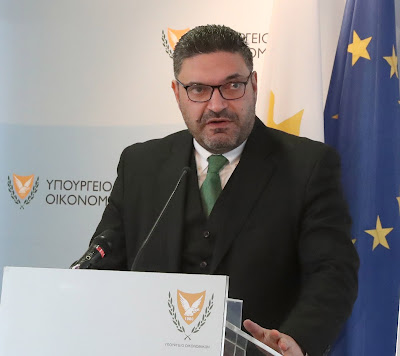Cyprus Mail 27 July 2021 - by Elias Hazou
 |
| Finance Minister Constantinos Petrides will attend the committee session |
The House plenum will convene in an extraordinary session on Tuesday to revisit a bill that further renews a moratorium on foreclosures and which President Nicos Anastasiades has refused to sign off on.
The bill, passed by parliament earlier this month, would extend the freeze on repossessions – currently set to expire on 31 July – to the end of October.
Anastasiades did not sign off on it, sending the bill back to parliament. Among the grounds he cited for refusing to sign, he argued the bill is in breach of certain articles of the constitution – such as the right to freely enter into a contract – and it also breaches the principle of the separation of powers between the executive and legislative branches of government.
Should parliament in turn reject the president’s referral, Anastasiades reserves the right to take the matter to the supreme court.
Until the matter is settled, the current law applies, based on which the freeze on foreclosures expires on July 31.
As is often the case, rather than reject the president’s referral outright MPs will likely seek to tweak the bill so that it becomes acceptable to the presidency, thus avoiding court litigation.
On Tuesday the House finance committee will be convening to discuss how to proceed before the bill is put to the plenum for another vote.
Attending the committee session will be Finance Minister Constantinos Petrides, attorney-general Giorgos Savvides, and representatives of the central bank and the association of banks.
Reports said the majority of the parties will insist on passing the bill, but that they are open to changes.
Main opposition Akel, Diko, Dipa and the Greens would not budge on passing the item; ruling Disy are expected to go along with the president’s refusal to sign the bill.
The House is currently in its summer recess, hence the need to call an extraordinary session.
The bill that MPs passed on 8 July – and whose fate will be determined on Tuesday – provides for prohibiting repossessions on primary residences valued at up to €350,000, business premises with annual turnover of up to €750,000, and agricultural land plots valued at up to €100,000.
Lawmakers had passed the bill despite warnings from the government and the banking industry not to. Both the government and the banks advised against extending the moratorium on repossessions because of the moral hazard – given that foreclosures serve as a tool and an incentive encouraging delinquent debtors to restructure their loans.
Cyprus Mail 27 July - Cyprus Mail ''Our View''
The House of Representatives will suspend its summer recess on Tuesday to discuss the president’s return of the law extending the suspension of the foreclosures law until October 31. First the House finance committee will meet to examine the reasons given to justify the president’s decision and prepare a report for the plenum to discuss subsequently.
It is doubtful there will be much rational discussion at the plenum as the matter has become a clash between the president and the opposition parties, engaging in their customary populism, as the alleged defenders of house owners against the inhumanity and greed of the banks. This is the simplistic way the matter has always been presented by opposition parties, which seem incapable of seeing the negative consequences for the economy.
These were listed in an announcement issued by the president on Monday, but even if the parties disregard the danger in which they put the economy, they cannot so flagrantly violate the constitution. How can lawmakers show such ignorance of the constitution, which safeguards the freedom to enter a contract (Article 26); the law passed interferes in a contractual agreement between a bank and a borrower. It also clashes with article 30 guaranteeing access of contracting parties to justice.
These violations of the constitution have been in force since December 2020, on the pretext of the pandemic, but the president had not objected to the law until now, which explains why the parties keep extending it. The freezing of foreclosures on houses and business premises up to a certain value was originally supposed to be in force until the end of March, was extended to the end of July and, most recently, to the end of October.
It should never have been allowed to pass by the president in the first place. Now President Anastasiades is complaining, quite rightly, that the suspension of the law could not be deemed temporary. The continued votes by the House for the extension of the suspension of the law could lead to this being interpreted as a permanent suspension by borrowers and by the supervisory authority, said the president’s announcement.
And it would not be a mistaken interpretation by supervisory authorities, given the way the opposition parties have made it their mission to protect people, many of them strategic defaulters refusing to repay their bank loans. The pandemic has become a very convenient excuse, but there had been attempts to suspend the foreclosures law before the outbreak of Covid-19 because protecting people not repaying their bank loans is a populist cause.
We can only express the hope that sanity will prevail at the House plenum and the parties will defend the interests of the economy rather than the interests of strategic defaulters.